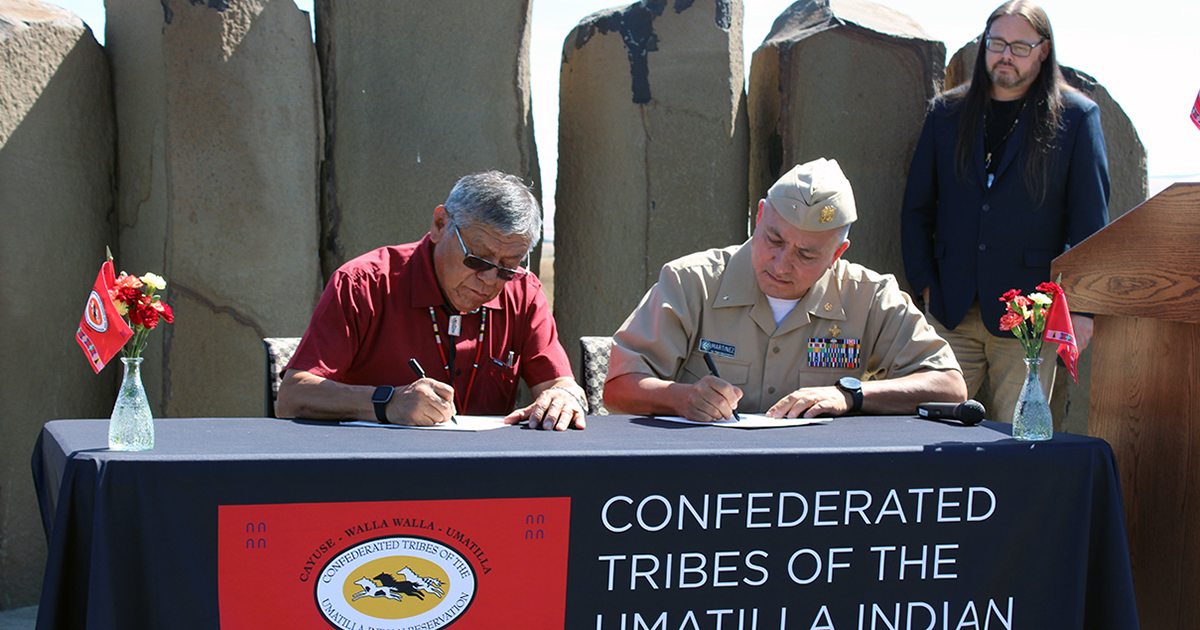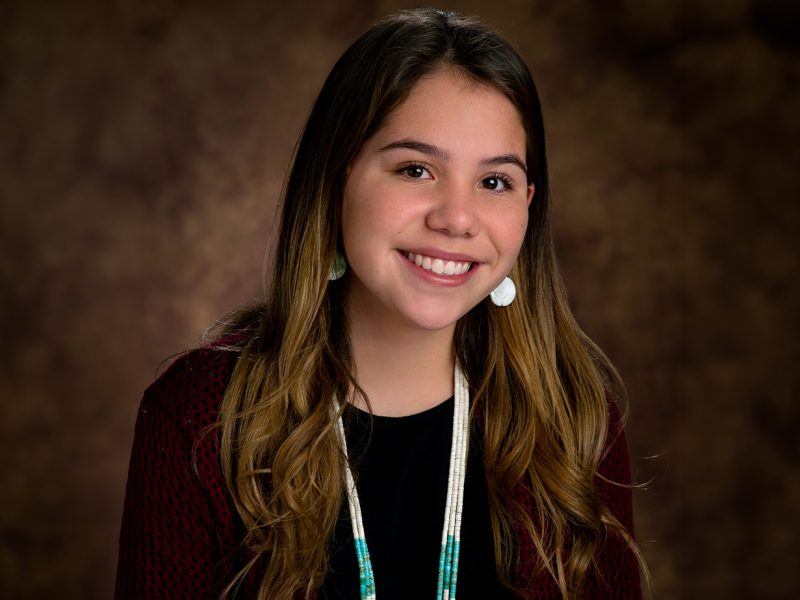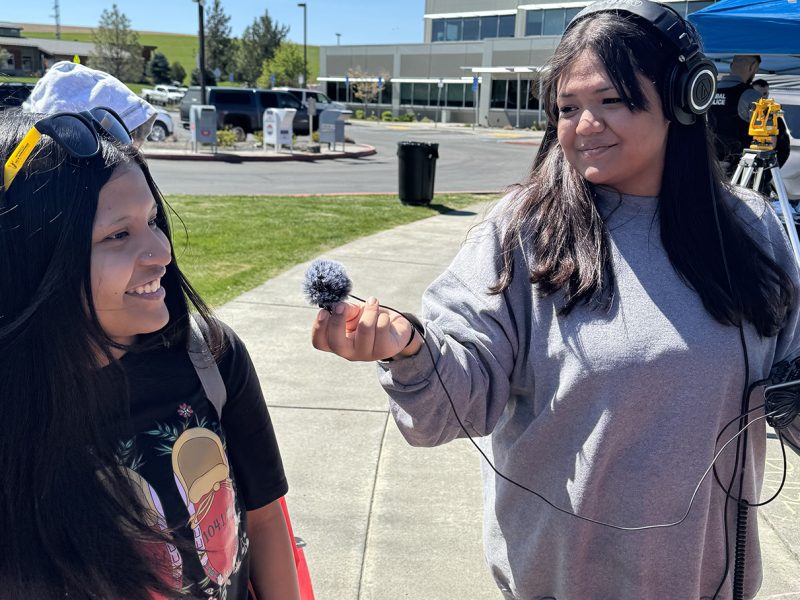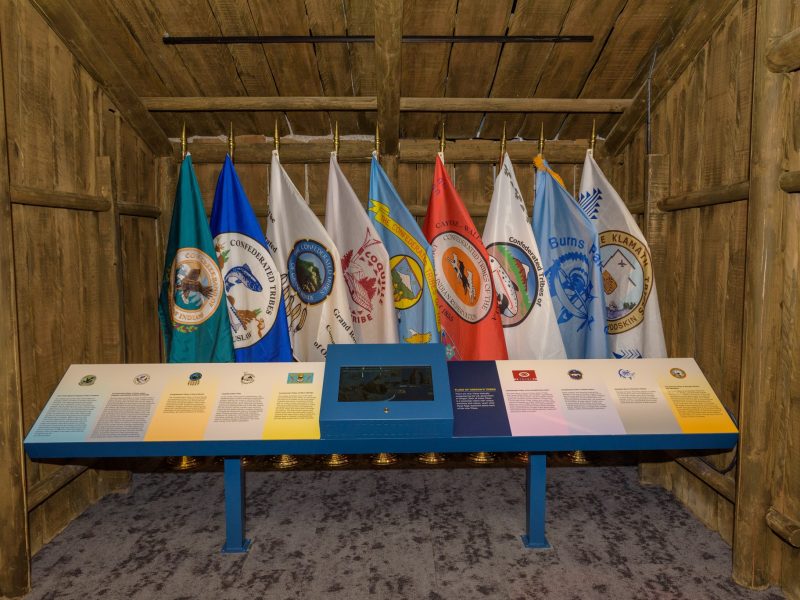MISSION – The Confederated Tribes of the Umatilla Indian Reservation (CTUIR) chairman and Indian Health Service (IHS) deputy director signed a memorandum of agreement on Monday, Aug. 26 for the tribe’s $44.5 million wastewater treatment project.
In front of the Nixyáawii Governance Center, CTUIR Chairman Gary I. Burke and IHS Deputy Director Benjamin Smith signed the MOA appropriating $38 million from the IHS Sanitation Facilities Construction (SFC) Program for the Mission Community Wastewater System Upgrade.
“This historical project is going to help our tribal membership and our enterprises, both of which are very important to us,” Burke said. “Water is very important to all of us. It sustains life. It is part of our religion and part of our First Foods. The CTUIR is thankful for the opportunity to host such an important day to kick off World Water Week and celebrate with the ceremonial signing for the largest funding allocation from the Indian Health Service Sanitation Facilities Construction Program in its 65-year history.”
CTUIR Public Works will operate the facility along Mission Road with the ability to treat up to 1.5 million gallons of wastewater per day. It will also conserve aquifer water by maintaining current demand levels while serving the growing community.
Public Works officials estimate that in less than 20 years approximately 444,000 gallons of reuse water would be available daily to offset water withdrawals from the regional aquifer. The treatment and reclamation process will produce Class A-recycled water suitable for watering lawns and gardens.
The wastewater facility will include collection system improvements, packaged activated sludge and tertiary filtration treatment systems, sludge drying beds, an ultraviolet disinfection system, 19,000-feet of recycled wastewater conveyance, an approximately 92-million-gallon capacity of recycled water storage and irrigation intake and a pump station.
Smith said the facility will help the IHS meet its mission while making history in its Portland Area.
“At the Indian Health Service, our mission is to raise the physical, mental, social and spiritual health of all American Indians and Alaska Natives to the highest level, and we know that water is an essential and critical factor in doing that,” he said. “So today not only are we celebrating your project here, but we’re also celebrating 65 years of this important authorization and funding known as the IHS Sanitation Facilities Construction Program. Today, we are celebrating the largest Sanitation Facilities Construction project here in the Indian Health Service Portland Area.”
Joining Smith were Rear Adm. Marcus Martinez, IHS Portland Area director; Capt. Alexander Dailey, IHS Portland Area SFC director; Lt. Cmdr. Patrick Fox, Western Oregon District engineer; Lt. Michael Blasy, Yakama Field Office senior environmental engineer; and Joshuah C. Marshall, IHS director senior advisor.
During World Water Week (Aug. 25−29), the IHS will host events across Indian Country to highlight projects funded by the Bipartisan Infrastructure Law (BIL) and recognize the importance of improving water and sanitation infrastructure in tribal communities. The CTUIR event was the first stop.
Annually appropriating $700 million from fiscal years 2022 to 2026 to the SFC Program, the BIL supports sanitation projects resulting in improvements to clean water and sanitation systems in American Indian and Alaska Native communities. More than 800 projects are in some state of implementation, ranging from procurement to final report.
Along with the IHS funding, U.S. Sens. Jeff Merkley and Ron Wyden secured $3 million from the Environmental Protection Agency for the wastewater project. The CTUIR will provide $3.5 million.
Construction on the facility is expected to start in late 2025 with a completion goal in late 2027.



